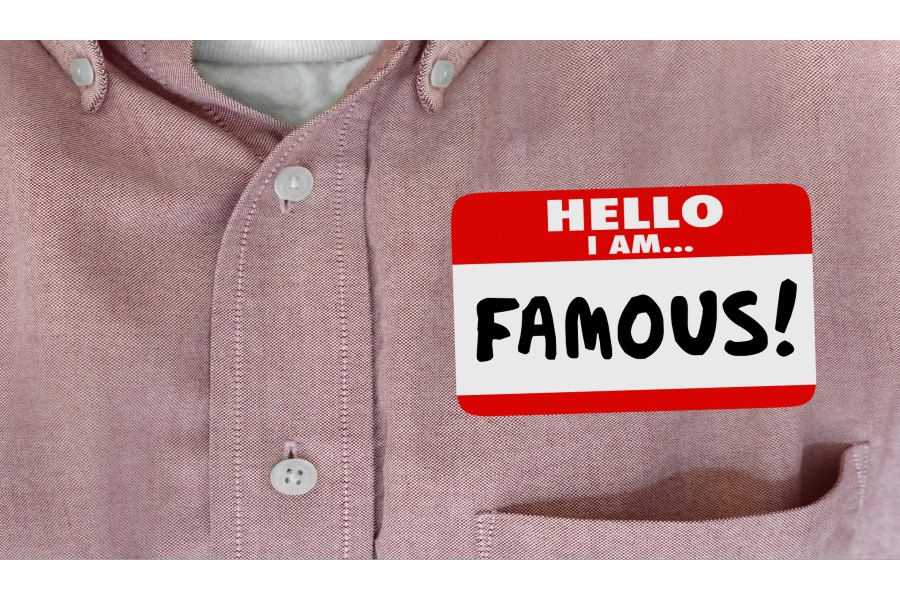Still not convinced you’re good enough, and people will like you just fine as you are? Read on.
– Chuck McKay
If you still think you need a good looking, easy going, casual person to take the front of the camera position, let’s consider hiring a proxy spokesperson.
However, remember that every proxy spokesperson brings reputation, attitude, and personal values to the job. It’s critical that these attributes match, or at least complement, those of the company’s owner and the company’s image / professional reputation.
I’ve seen it, and you probably have, too. Junior takes over from Mom and Dad, and starts publicly making changes in the company’s structure. Long term this might be a good move. But short term? The people who identify as Mom and Dad’s tribe liked the company the way it was. If Junior makes wholesale changes to the point customers no longer identify, watch how quickly they shop elsewhere.
Rent a Celebrity
We could contract a celebrity and use that celebrity’s status to promote our company. Nike has done this very well with Michael Jordan. He doesn’t even say anything about Nike. He just wears their shoes and clothing on camera. A little tough to make sales points when the celebrity won’t voice them, but, OK.
GoDaddy seems to have benefitted from their association with race driver Danica Patrick.
When he promotes their pain relief “patch,” Icy Hot exploits Shaquille O’Neal’s credibility as an athlete.
William Shatner did such a convincing job as the Priceline Negotiator that the company had to stop using him when they became a flat-rate buying service.
Oh, and celebrity endorsers don’t come cheap. The greater their celebrity, the higher the price. Remember, too, this doesn’t buy us any advertising. It only gets us a high priced “talent” instead of you pitching our service.
Celebrities Occasionally Backfire
 Just as Michelob launched a nationwide campaign titled The Night Belongs to Michelob, complete with 400,000 posters, a commemorative cassette, and massive numbers of television gross ratings points, spokesperson Eric Clapton turned himself in for alcohol rehabilitation.
Just as Michelob launched a nationwide campaign titled The Night Belongs to Michelob, complete with 400,000 posters, a commemorative cassette, and massive numbers of television gross ratings points, spokesperson Eric Clapton turned himself in for alcohol rehabilitation.
We have to feel badly for Jenny Craig, who hired Kirstie Alley and her ever-ballooning waistline to speak on behalf of their diet program.
Wheaties dropped Olympian Michael Phelps when he was photographed taking a bong hit at a party.
Yardley Cosmetics was appalled to learn their spokesperson, actress Helena Bonham Carter, confessed she never used their cosmetics.
And it gets worse.
24-Hour Fitness had to drop Lance Armstrong when the news came out about his doping before each race.
Oakley sunglasses didn’t benefit from their association with Oscar Pistorius when he shot and killed his girlfriend.
Hertz completely stopped using celebrity endorsers when OJ Simpson was charged with killing his ex-wife.
And who could forget Subway’s Jared Fogel, who’s now doing 15 years in a federal prison for child pornography?
No. We don’t need any of those risks. You, Mr. Owner, should be your company’s spokesperson.
What? I still haven’t convinced you?
Humm.
What other possibilities are there than celebrity spokespeople?
Testimonials
We could get customers to do “testimonial” ads for us. Please understand that endorsements and testimonials are not the same thing. A testimonial has a problem, and a solution – “That drippy faucet kept me up for a week and a half until Bob the plumber replaced the washers in the mechanism. Now I sleep soundly again.” An endorsement is a much simpler “I like these people. I think you will, too”
So, why not use happy customers to speak for us? Two problems with this idea. Well, three, actually.
First, we need to find customers who have allowed us to solve a very specific problem for them – the problem which we advertise as our specialty.
Second, despite being generally happy with our services, too many homeowners just have no interest in helping us.
Finally, way too many people are self-conscious. (You understand this, don’t you, Mr. Advertiser?) They will put off committing their testimony to paper or video because they believe they’re going to be judged. They believe they must deliver a stellar performance. Truth is, all we want is realism.
Those things add up to great difficulty in getting enough cooperation to create enough ads for a campaign.
Get Dramatic
We could produce the old “slice of life” drama.
“Oh, Helen, Bob hates my coffee and I don’t know what to do.”
“Now, Dear, there’s no secret to making good coffee. Just buy Beano brand. It’s grown in the old country, you know.”
Slice of life drama requires multiple actors, a skilled writer, and a good director.
And, since ads wear out, one is never enough. Better budget for a lot of them.
Invent a Character
We could create a fictitious person to speak for us.
Annie from Popeye’s Chicken is a good example. Is she a fry cook? The president of the company? We don’t know, and it doesn’t matter. She’s proud to serve her chicken and we instantly recognize her in each ad.
Who doesn’t love Flo, the ever-enthusiastic presenter of Progressive Insurance products. She has a major fan base on all of the social networks, and she’s instantly identifiable with Progressive Insurance. Flow has appeared in over 100 Progressive ads since 2008.
Another popular character mascot is Lily, the sales clerk in the AT&T Mobile ads. Lily effortlessly transforms from innocent to knowledgeable to oblivious; from enthusiastic to disenchanted; from delightful to cynical. She drips personality, and her association with the brand is proving to be long running.
The character of Jack I. Box, complete with ping pong ball head, is portrayed as the founder and CEO of Jack in the Box restaurants. The company has averaged 22 commercials per year since 1994.
The great thing about characters: done well you can change creative directions, and replace them without any loss of momentum. How many different campaigns has Geico Insurance run over the last couple of decades? The Geico Gecko, Maxwell the Pig, Caveman, Freeze Frame (You Can’t Skip This Geico Ad ‘Cause It’s Already Over).
Production Costs
 Have I mentioned that most national TV ads currently cost between $350,000 and $500,000 to produce?
Have I mentioned that most national TV ads currently cost between $350,000 and $500,000 to produce?
Your local ad is going to be sandwiched between ads for McDonalds and Chevrolet. They spent half a million each just on the production. In a local market, for top notch work you’re going to budget, how much? $10,000? $15,000? Right away you’re at an image disadvantage as viewers compare the high quality national ad with your low budget local one.
But, the cost of a close up of you, Mr. Business Owner, as you sincerely share your conviction of why your company offers a superior product or service is much less expensive, and has the additional value of standing out as different and attention grabbing. People will notice and pay attention for that reason alone.
And, eventually contracts run their course. Actors go on to the next stage of their careers. Very few find representing your company lucrative enough to want to do it for decades.
Face it, Mr. Business Owner, you really need to be the public face of your company. Forever.
There is an Exception
I work with a significant number of contractors who are planning their own exit from the companies they’ve built. Several of them are turning the firm over to a son or daughter who has grown up in the business.
If the transition will happen soon, that son, daughter, nephew, grandson, or other next generation family member could be the logical proxy spokesperson for your company. Not because it lets you off the hook. But because the next Owner/President/General Manager is the logical voice/face of the company… especially when that image is likely to carry on for decades.
And the ad campaign we create around the values and personality of the next person in charge will, like all good image advertising, continue to work better the longer we use it.
You, as the company spokesperson, will become a local celebrity. How to present yourself is the topic of Part 12 of this series.
__________
The content for this series of posts was taken from Chuck McKay’s The Personality Prescription for Contractors, available on Amazon.
Links to previous posts in this series:
Part 3 – You’re Choosing Cheap Ones
Part 4 – Other Homeowners’ Motivations
Part 8 – Your Company’s Reputation
Part 10 – The Company Spokesperson
- How Many Pancake Restaurants? - October 7, 2024
- Bringing Newcomers into the Labor Pool - January 4, 2023
- Hire Veterans Reentering the Local Job Market - December 28, 2022

